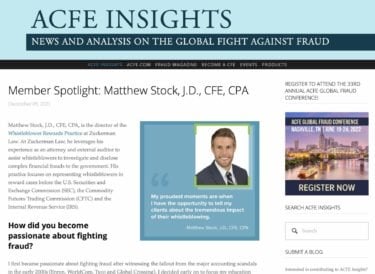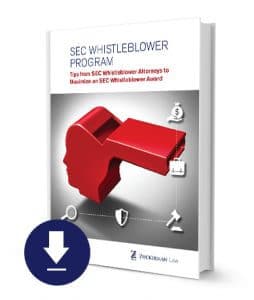Whistleblowing About Violations of the Federal Securities Laws
Any violation of the federal securities laws qualifies for an SEC whistleblower award. The SEC has broad jurisdiction over a wide range of industries and entities—both public and private. In FY 2023, the SEC received more than 18,000 whistleblower tips alleging a variety of misconduct. The most common complaint categories reported by whistleblowers were Manipulation (24%), Offering Fraud (19%), Initial Coin Offerings and Crypto Asset Securities (14%), and Corporate Disclosures and Financials (10%). The most common SEC whistleblower tips involve:
- Accounting fraud;
- Investment and securities fraud;
- Insider trading;
- Foreign bribery and other FCPA violations;
- EB-5 investment fraud;
- Manipulation of a security’s price or volume;
- Fraudulent securities offerings and Ponzi schemes;
- Hedge fund fraud;
- Unregistered securities offerings;
- Investment adviser fraud;
- Broker-dealer anti-money laundering program violations;
- False or misleading statements about a company or investment;
- Inadequate internal controls;
- Deceptive non-GAAP financials;
- Improper revenue recognition;
- Violations of auditor independence rules;
- Misleading or incomplete cybersecurity disclosures; and
- Blockchain and cryptocurrency fraud.
Contact our experienced and effective SEC whistleblower lawyers today to find out if you might be eligible for an SEC whistleblower award. We provide critical guidance to whistleblowers throughout this process to protect their identities and increase the likelihood that they obtain the maximum award.
In conjunction with our courageous clients, our SEC whistleblower lawyers have helped the SEC halt multi-million dollar investment schemes, expose violations at large publicly traded companies, and return funds to defrauded investors. And we have secured multi-million dollar awards for our clients.
Under the SEC Whistleblower Program, a whistleblower’s tip must lead to collected monetary sanctions (penalties, disgorgement, and interest) in excess of $1 million to be eligible for an award. Click below to hear SEC whistleblower lawyer Matt Stock’s tips for SEC whistleblowers:
Recently the Association of Certified Fraud Examiners published a profile of SEC whistleblower lawyer Matt Stock’s success working with whistleblowers to fight fraud:
SEC Whistleblower Law Firm
For more information about whistleblower rewards and bounties, click here and contact the SEC whistleblower lawyers at Zuckerman Law at 202-262-8959.






To learn more about the SEC Whistleblower Program, download Zuckerman Law’s eBook: SEC Whistleblower Program: Tips from SEC Whistleblower Attorneys to Maximize an SEC Whistleblower Award:
- See our column in Forbes: One Billion Reasons Why The SEC Whistleblower-Reward Program Is Effective.
- See our column in Going Concern: Sarbanes-Oxley 15 Years Later: Accountants Need to Speak Up Now More Than Ever.
- See our post in Accounting Today: Whistleblower Protections and Incentives for Auditors and Accountants.
- See our article providing Tips for SEC Whistleblowers
SEC Whistleblower FAQs
These FAQs provide additional examples of the types of securities law violations that can qualify for an award:
- Can a Whistleblower Disclosure About Misleading Earnings Projections Qualify for an SEC Whistleblower Award?
- Can a whistleblower disclosure to the SEC about cybersecurity qualify for a SEC whistleblower award?
- SEC Whistleblower-Reward Program is a Critical Tool to Combat EB-5 Investment Fraud
- Report Improper Revenue Recognition and Qualify for an SEC Whistleblower Award
- Money Laundering and the SEC Whistleblower Program
- Can a whistleblower get an award for reporting books and record violations?
Eligibility for an SEC Whistleblower Bounty and Tips for SEC Whistleblowers
Tips to Successfully Navigate SEC Whistleblower Process
SEC Whistleblower Awards
whistleblower_lawyers_012017_infographicAny violation of federal securities laws qualifies for an award under the SEC Whistleblower Program. The FCC has broad jurisdiction over both public and private entities. The most common tips that the SEC receives involve violations in public filings, investment violations, and insider trading tips. However, other notable areas of SEC enforcement include things such a foreign bribery, EB-5 fraud, and even auditor independence violations.





